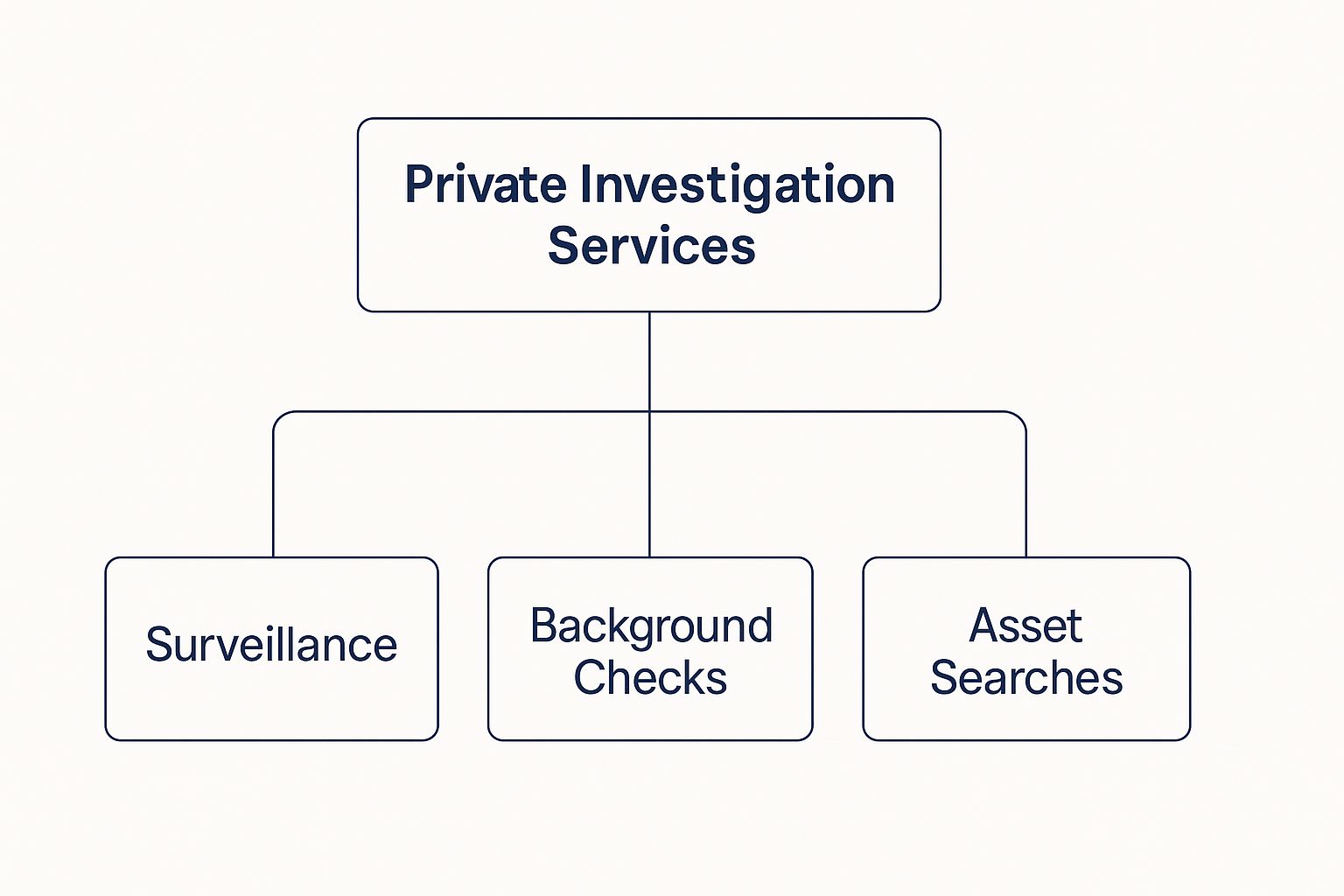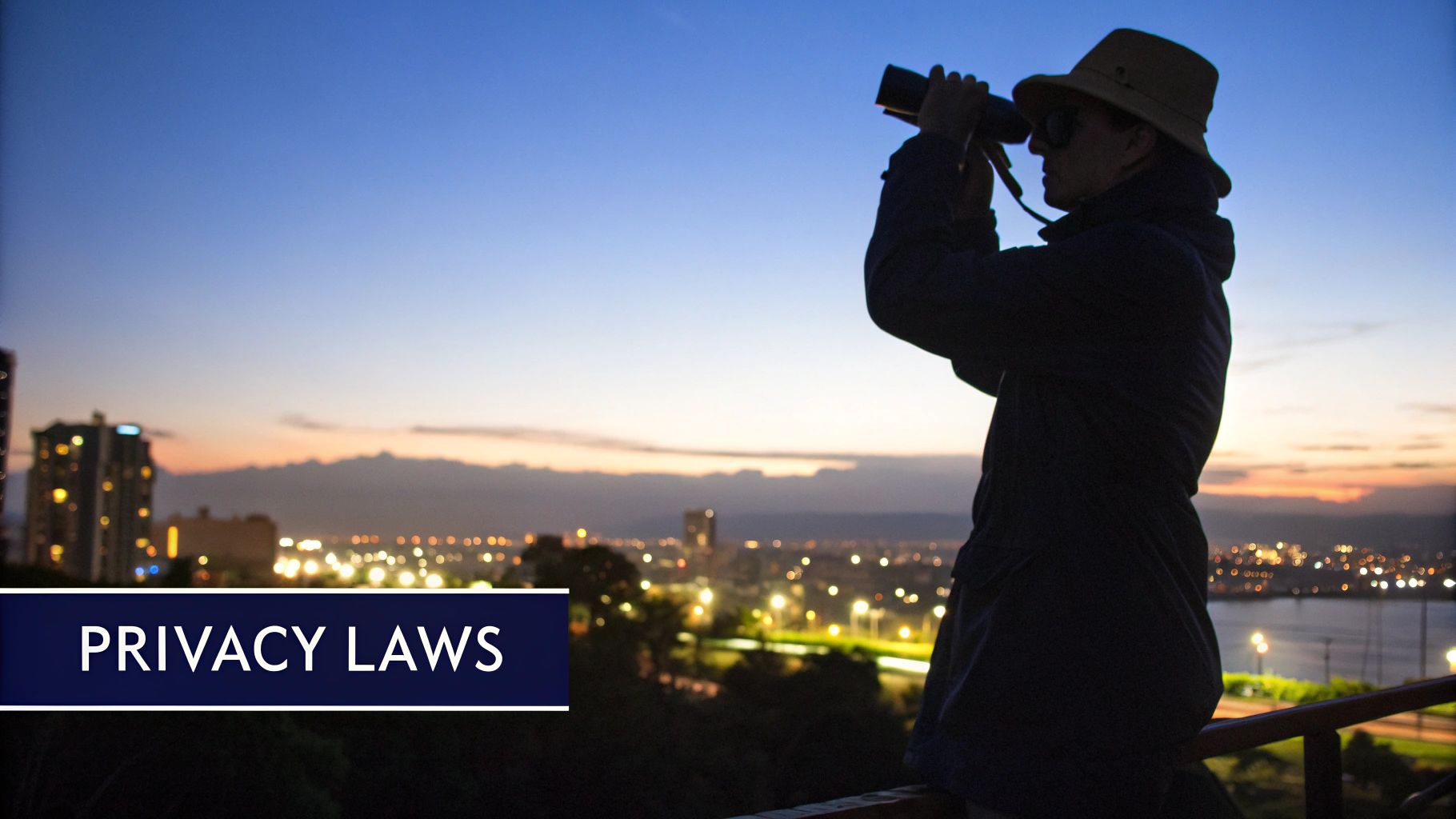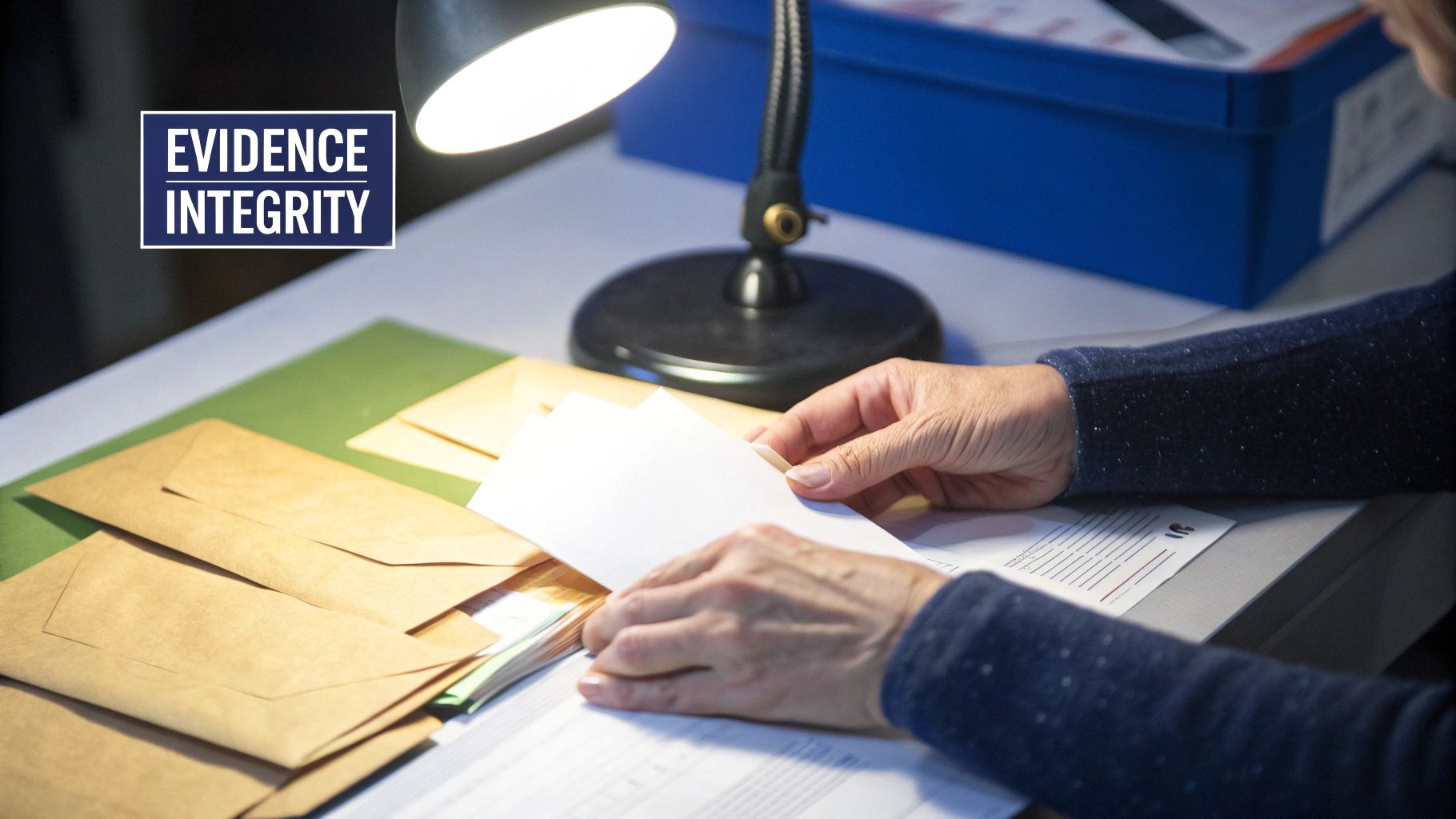A Guide to Private Investigation Law in the UK
- Showix technical Team
- Jul 18, 2025
- 15 min read
Updated: Jul 26, 2025
When you start looking into private investigation law in the UK, you'll quickly discover a surprising fact: there is no mandatory government licensing. This isn't like hiring a solicitor or a doctor who must have a specific, government-issued credential to practise. Instead, the private investigation industry is self-regulated, placing the responsibility for operating legally and ethically squarely on the investigator's shoulders.
Navigating the Unregulated Landscape
The absence of a formal licensing system can seem odd for a profession that handles such sensitive information. It means anyone can technically call themselves a private investigator. This puts the onus on you, the client, to do your due diligence, and on the investigator to prove their professionalism.
It’s a bit like hiring a specialist tradesperson before formal certifications became the norm. You wouldn't look for a piece of paper they don't have. Instead, you'd judge them on their reputation, their past work, and their understanding of the craft. Choosing a good PI is much the same—you're looking for their commitment to high ethical standards and their deep knowledge of the law.
Why Self-Regulation Matters
In a field without official oversight, professional bodies like the Association of British Investigators (ABI) become absolutely vital. They step in to fill the regulatory gap, establishing a code of conduct, setting professional standards, and creating a benchmark for quality that clients can trust.
Membership in an organisation like the ABI is a clear sign that an investigator takes their legal and ethical obligations seriously. These associations ensure their members are:
Properly vetted with background checks.
Covered by professional indemnity insurance.
Registered with the Information Commissioner's Office (ICO).
Well-versed in the laws that govern their work.
Essentially, this creates a clear divide: you have professional investigators who voluntarily hold themselves to a higher standard, and then you have rogue operators who take advantage of the lack of mandatory licensing.
A Growing and Evolving Industry
The demand for private investigation has grown significantly in recent years, for both corporate and personal matters. From tackling corporate fraud and tracing missing assets to resolving complex family issues, the need for professional fact-finders is greater than ever. As outlined in recent industry analysis, this growth shows no signs of slowing down.
This image breaks down the core services that most private investigators offer.

As you can see, core activities like surveillance, background checks, and locating assets are the bread and butter of the profession, each governed by its own set of legal rules.
The most important thing to remember is this: while there’s no single "PI licence," an investigator’s every move is governed by a complex web of existing UK laws. They aren’t above the law; in fact, a good investigator needs a much deeper understanding of it than the average citizen to do their job properly and ensure any evidence they gather is admissible.
Although a single licensing act doesn't exist, a professional PI must navigate a minefield of legislation to operate legally. The table below summarises the main legal pillars they must work within.
Key Legal Pillars Governing UK Private Investigators
Legal Area | Primary Legislation | Relevance to Private Investigation |
|---|---|---|
Data Protection | Data Protection Act 2018 & UK GDPR | Governs how PIs can legally collect, process, store, and share personal information. |
Human Rights | Human Rights Act 1998 | Article 8 (Right to a private and family life) sets strict limits on surveillance activities. |
Surveillance | Regulation of Investigatory Powers Act 2000 (RIPA) | Primarily applies to public bodies, but its principles inform private sector best practice. |
Computer Misuse | Computer Misuse Act 1990 | Makes it illegal to access computer systems or data without authorisation (i.e., hacking). |
Harassment | Protection from Harassment Act 1997 | Prevents investigators from engaging in conduct that could be deemed harassment. |
These laws create the boundaries. A legitimate investigation is one that works skilfully within these rules, not one that ignores them.
Staying Compliant with GDPR and Data Protection
The moment a private investigator touches any piece of information about a living person, they enter the world of data protection law. In the UK, this landscape is dominated by two hefty pieces of legislation: the General Data Protection Regulation (GDPR) and the Data Protection Act 2018. Getting to grips with these rules isn't just a box-ticking exercise; it’s absolutely fundamental to running a lawful investigation.
Think of it this way: personal data is like private property. An investigator can't just wander in and grab what they want. They need a legitimate, legal reason—a key, if you will—to access and handle that information. Without this "lawful basis," they're essentially trespassing on someone's privacy, and the penalties for that can be severe.

What Is Personal Data?
The first hurdle to clear is understanding what "personal data" actually is. It's a much wider net than most people realise. Basically, it’s any snippet of information that could be used to identify a living person, either by itself or when pieced together with other details.
We’re not just talking about the obvious things like names and addresses. It also covers:
Email addresses and phone numbers
Photographs and video recordings of people
Vehicle registration numbers
IP addresses from computers and phones
Employment history and financial records
Even details that seem less direct, like someone's physical description or job title, can count as personal data if they help to single that person out. A professional investigator must treat every piece of this information with the high level of care demanded by private investigation law.
The Lawful Basis for Processing Data
An investigator can't just process personal data on a whim. They must have what GDPR calls a "lawful basis" to do so. For the kind of work PIs do, the most common and relevant basis is "legitimate interests."
This means the investigator, or their client, has a genuine and legitimate reason to process the data that isn't outweighed by the individual's own rights and freedoms. For instance, an insurance company investigating a suspicious, high-value claim would almost certainly have a legitimate interest.
A key legal test is balancing the need for the investigation against the individual's right to privacy. The intrusion must be necessary, proportionate, and justified. Simply being curious is never a valid reason.
To stand on the ground of legitimate interests, an investigator must complete a Legitimate Interests Assessment (LIA). This three-part test is crucial. It involves identifying the interest, proving the processing is necessary to achieve it, and weighing it all against the individual’s rights. This document is a cornerstone of any ethical, defensible investigation.
Common Scenarios and Pitfalls
Let's look at how these rules play out on the ground.
Scenario 1: A Corporate Fraud Investigation A company suspects an employee is leaking sensitive data to a competitor. They hire a PI to monitor the employee's activity on their work-issued laptop. This is very likely a legitimate interest, but the investigation has to be tightly focused. Rummaging through the employee’s personal, non-work-related emails on that laptop would probably be seen as disproportionate and illegal.
Scenario 2: A Cohabitation Investigation A client needs to prove their ex-partner is living with someone new, which would affect their maintenance payments. A PI conducts surveillance in public spaces to record the couple coming and going from a shared home. This processing of data (photos, time logs) is likely lawful because it serves the client's genuine interest in a legal matter. However, it must be done without harassment, and more intrusive methods can get very tricky. Using a GPS tracker on a privately owned car, for example, is a legal minefield. We break this down in detail in our complete legal guide on GPS tracking laws in the UK: https://www.sentryprivateinvestigators.co.uk/post/gps-tracking-laws-uk-your-complete-legal-guide.
A common pitfall is what's known as "data fishing"—gathering a huge amount of data in the vague hope that some of it might turn out to be useful. GDPR’s principle of data minimisation strictly forbids this. An investigator must only collect what is directly relevant to the case's specific goals. To ensure your operations are watertight, using a thorough GDPR Compliance Checklist is a smart move. Getting this wrong can torpedo an entire investigation.
What Surveillance Methods Are Legally Allowed

Surveillance is the bread and butter of many private investigations, but it's also where the law draws its clearest and most important lines. A professional PI must have a rock-solid understanding of where legal observation ends and illegal intrusion begins. The core principle is actually quite simple: what people do in public is generally fair game, but their private lives are protected.
An investigator can legally watch and record someone in a public space. We’re talking about places like streets, parks, shopping centres, or the outside of a building. In these environments, there's no "reasonable expectation of privacy," which means filming or taking pictures of a person's activities is usually allowed.
It's vital to remember that PIs are not the police. They don’t have the special powers given to public authorities under the Regulation of Investigatory Powers Act 2000 (RIPA). This act governs things like intercepting communications (phone calls, emails), which are strictly off-limits for private investigators.
Strictly Forbidden Surveillance Tactics
Stepping over the line from observation into intrusion comes with severe consequences. We're talking criminal charges, massive fines, and any evidence gathered being thrown out of court. The investigator doesn't just fail the case; they risk prosecution.
It’s crucial for both clients and investigators to know what is always illegal:
Phone Tapping and Bugging: Placing a listening device ("bug") inside someone's home, office, or car, or intercepting phone calls, is a serious criminal offence.
Hacking: Illegally accessing emails, social media profiles, or computer files is a crime under the Computer Misuse Act 1990.
Trespassing: An investigator cannot enter private property without permission, whether it’s to get a better view or to plant a device.
Mail Tampering: It is a crime under the Postal Services Act 2000 to open, read, or interfere with another person's mail.
These actions are a fundamental violation of privacy and have no place in a legitimate investigation. The skill of a professional lies in gathering intelligence legally. This is how private investigators help solve complex cases—by using creativity and lawful methods, not by breaking the law.
The Grey Area of GPS Vehicle Tracking
Using GPS trackers on vehicles is one of the trickiest areas in surveillance law. There isn't a single piece of legislation that gives a clear "yes" or "no." Instead, its legality depends on a web of factors, mainly revolving around who owns the vehicle.
If the client is the sole owner of the car, placing a tracker on it is generally considered legal, even if a spouse or employee is the primary driver. In essence, the owner is tracking their own property.
Things get muddy very quickly if the car is jointly owned, belongs entirely to the person being investigated, or is on a lease or finance plan. Attaching a device to a vehicle you don't own can be seen as interfering with property, which could lead to civil claims or even criminal charges.
Key Takeaway: When it comes to GPS tracking, the legality isn't about the technology itself. It’s about who holds the title to the asset it’s attached to. Any ethical investigator will perform a thorough ownership check before a tracker is even considered.
Technology has certainly changed the game. Modern tools, from digital forensics to sophisticated open-source intelligence gathering, let investigators find evidence more effectively than ever. This has boosted the demand for skilled professionals who can handle both the tech and the complex legal maze that comes with it.
Gathering Evidence That Stands Up in Court
An investigation is only as good as the evidence it produces. It's one thing to uncover information, but it's a whole different ball game to make sure that information will hold up in a court of law. This is where professional discipline and a solid grasp of private investigation law really count.

For evidence to be taken seriously by a judge, you have to prove its integrity. This all comes down to a legal concept known as the "chain of custody," which is simply the unbroken, documented trail of a piece of evidence.
Think of it like the baton in a relay race. For the team to win, that baton has to be passed cleanly from runner to runner. If it's dropped, fumbled, or messed with in any way, the team gets disqualified. It's the same in a legal case. If the chain of custody is broken—meaning there are gaps in who handled the evidence and when—that evidence can be thrown out, making it completely useless.
Mastering the Chain of Custody
Maintaining this chain requires a meticulous, almost obsessive, approach to record-keeping. It's not just about what you found, but how you found it, handled it, stored it, and eventually presented it. Every single step needs to be logged.
A professional investigator follows a strict protocol for everything they collect, whether it’s a digital video file, a photograph, or a physical document. This process ensures the evidence remains pure and untainted. The careful handling of what's collected is absolutely vital, and for a deeper dive into the level of detail required, looking into document management strategies for legal professionals can be quite revealing.
The core steps look something like this:
Secure Collection: Evidence is gathered in a way that prevents any contamination or changes. For digital evidence, this means making secure, uneditable copies.
Detailed Logging: Every item is logged with the date, time, location it was found, and the name of the investigator who collected it.
Secure Storage: The evidence is then kept in a secure place where access is strictly controlled and logged. This stops anyone unauthorised from ever touching it.
Documented Transfer: If the evidence needs to be moved or given to someone else (like your solicitor), that handover is also recorded in the log.
This watertight record proves to a court that the evidence being presented is the exact same evidence that was collected at the start, with no alterations.
The Human Rights Act and The Balancing Act
Beyond just following procedure, there’s a major legal hurdle to consider: the Human Rights Act 1998. The key part for investigators is Article 8, which protects every person's "right to respect for his private and family life, his home and his correspondence."
What this means in practice is that a court has to perform a delicate balancing act. It has to weigh how important the evidence is to the case against how much someone's privacy was invaded to get it.
Evidence obtained in a way that is seen as a disproportionate breach of someone's Article 8 rights will almost certainly be thrown out. A court will ask tough questions: Was the surveillance truly necessary? Could the same information have been found in a less intrusive way?
For instance, filming someone in a public park is generally seen as a minimal intrusion. But using a long-lens camera to see inside their living room? That's a serious breach, and any evidence from it would likely be deemed inadmissible. An investigator must always be able to justify their methods as a necessary and proportionate part of the job.
Ultimately, any evidence you gather not only has to be handled correctly, but it must be obtained in a way that respects these fundamental rights.
Upholding Professional and Ethical Standards
In the UK, the private investigation industry isn't government-regulated. This might surprise you. Without official licences, what stops a "private eye" from becoming a rogue operator? The answer is simple: professionalism and a deep-seated commitment to ethics.
This isn't just about lofty ideals. It's the practical, day-to-day application of private investigation law. Every action an investigator takes must be legally defensible, ethically sound, and ultimately, effective for the client. This commitment is the true hallmark of a professional. It's what separates the experts from the cowboys.
The Role of Professional Bodies
So, how can you spot a trustworthy investigator? A great first step is to check for membership in a respected professional body, like the Association of British Investigators (ABI).
Joining an organisation like the ABI is entirely voluntary. It’s a choice an investigator makes to hold themselves to a higher standard. It sends a clear signal to clients: "I am willing to be held accountable." Membership isn't just a case of paying a fee; it usually requires passing strict background checks, holding professional indemnity insurance, and being registered with the Information Commissioner's Office (ICO).
When you work with a member of a professional body, you're not just hiring an individual. You're engaging someone who has actively placed themselves under professional scrutiny, proving they take their legal and ethical duties seriously.
Professionalism is the anchor in a self-regulated field. It's about demonstrating integrity, objectivity, and discretion at every turn, ensuring the client's interests are served without ever crossing legal or ethical lines. This is the core of a modern private investigator's role.
If you'd like to explore this further, our guide on understanding the role of a private investigator in modern cases provides a much deeper look into these responsibilities.
Core Ethical Principles in Practice
Ethics in this line of work go far beyond simply belonging to an association. It’s about how an investigator conducts themselves every single day. It’s about building trust and delivering results you can rely on.
This means maintaining absolute discretion. Your sensitive information has to be protected at all costs. It also demands unwavering objectivity. A professional's job is to find the facts, not to invent a story that suits what the client wants to hear. They report what they find, good or bad.
Furthermore, ethical practice means being completely transparent with you, the client. This includes clear, upfront fee structures with no nasty surprises, along with regular, honest updates on how the case is progressing. It's about managing expectations and being straight about what is—and isn't—legally possible.
The Fine Line of Using Pretext
One of the trickiest ethical areas for an investigator is using a pretext. This is essentially adopting a persona to gather information. For instance, an investigator might phone a company pretending to be a potential customer to ask about its business hours or services.
This can be a perfectly legal and ethical tool when used correctly. However, the line is incredibly fine. A pretext can't be used to impersonate a police officer or another person in a position of authority—that's a criminal offence. It also can't be used to trick someone into giving up protected personal data through a "material" deception. Think of a lie so significant it causes someone to do something they would never normally do, like sharing private financial details.
Ultimately, it all comes back to professionalism. An experienced, ethical investigator knows exactly where legitimate observation ends and illegal deception begins, ensuring every method they use will stand up to legal scrutiny.
Common Questions About Private Investigation Law
The world of private investigation often seems murky, leaving people with a lot of questions about what's legal and what's not. When you're dealing with a sensitive situation, you need clear, straightforward answers. That's exactly what this section is for – to cut through the confusion and tackle some of the most common questions about private investigation law in the UK.
We’ll look at the key concerns people have, clarifying the legal and ethical lines that every professional investigator must respect. This will help you understand your rights and know what to expect when you hire an investigator, or if you find yourself being investigated.
Is It Legal for a Private Investigator to Follow Me in the UK?
In most situations, yes, it's perfectly legal for a private investigator to follow you. The crucial factor is where the surveillance is happening. Out in public spaces – think streets, parks, shopping centres, or town squares – you generally don't have a reasonable expectation of privacy.
This means that an investigator observing your movements, taking photos, or filming you in these public areas is usually well within the law. It’s a standard method for gathering evidence in all sorts of cases, from corporate fraud to personal matters.
But there are clear limits. The surveillance absolutely cannot tip over into harassment. Under the Protection from Harassment Act 1997, any actions that cause you alarm or distress are illegal. This could be anything from following you too closely and driving aggressively to acting in a way that feels intimidating. An investigator also can't follow you onto private property without permission – that’s just plain trespassing.
Can a Private Investigator Legally Access My Private Messages?
Absolutely not. It is completely illegal for a private investigator to get into your private text messages, emails, or social media DMs without your express permission. Gaining unauthorised access to private communications is hacking, plain and simple, and it's a criminal offence under the Computer Misuse Act 1990.
Any investigator who claims they can get you this kind of information is either lying or openly admitting they are prepared to break the law. Evidence gathered illegally would be thrown out of court and could land both the investigator and the client who hired them in serious legal trouble.
It's vital to understand the difference between private data and public information. While hacking a private account is a crime, looking at publicly available information is a standard, lawful part of an investigation.
This technique is known as Open-Source Intelligence (OSINT). It involves piecing together information that someone has already put out into the public domain, such as:
Public social media profiles and posts.
Comments on public forums or news articles.
Information on company websites or in public directories.
Content from blogs and video-sharing sites like YouTube.
A professional investigator uses OSINT to build a picture from the digital breadcrumbs a person has chosen to share publicly. It’s a world away from illegally breaking into their private life.
What Should I Do If I Suspect an Investigator Is Acting Illegally?
If you think a private investigator is breaking the law – by harassing you, trespassing, or trying to access your private data – you need to act. Your safety and privacy are what matter most.
First, document everything. Keep a detailed log of every incident. Note the dates, times, locations, and exactly what happened. If a car is involved, get the registration number. This record will be essential if you decide to report the behaviour.
If you feel you're in immediate danger or are being actively harassed, call the police right away. Harassment is a criminal offence, and the police are the right people to handle it.
For problems related to your data privacy, you can make a formal complaint to the Information Commissioner's Office (ICO). The ICO is the UK's independent authority for upholding information rights and investigating breaches of the Data Protection Act.
Finally, if you happen to know the investigator is a member of a professional body like the Association of British Investigators (ABI), you should report them. These organisations have strict codes of conduct and can take disciplinary action against members who don't meet professional standards.
Navigating the world of private investigation demands real expertise and an unwavering commitment to the law. At Sentry Private Investigators Ltd, we deliver discreet, professional services that operate strictly within the legal framework of the UK. Whether you need support with a personal issue or a corporate case, we have the experience to get results you can trust. Learn more about how we can help at Sentry Private Investigators Ltd.
